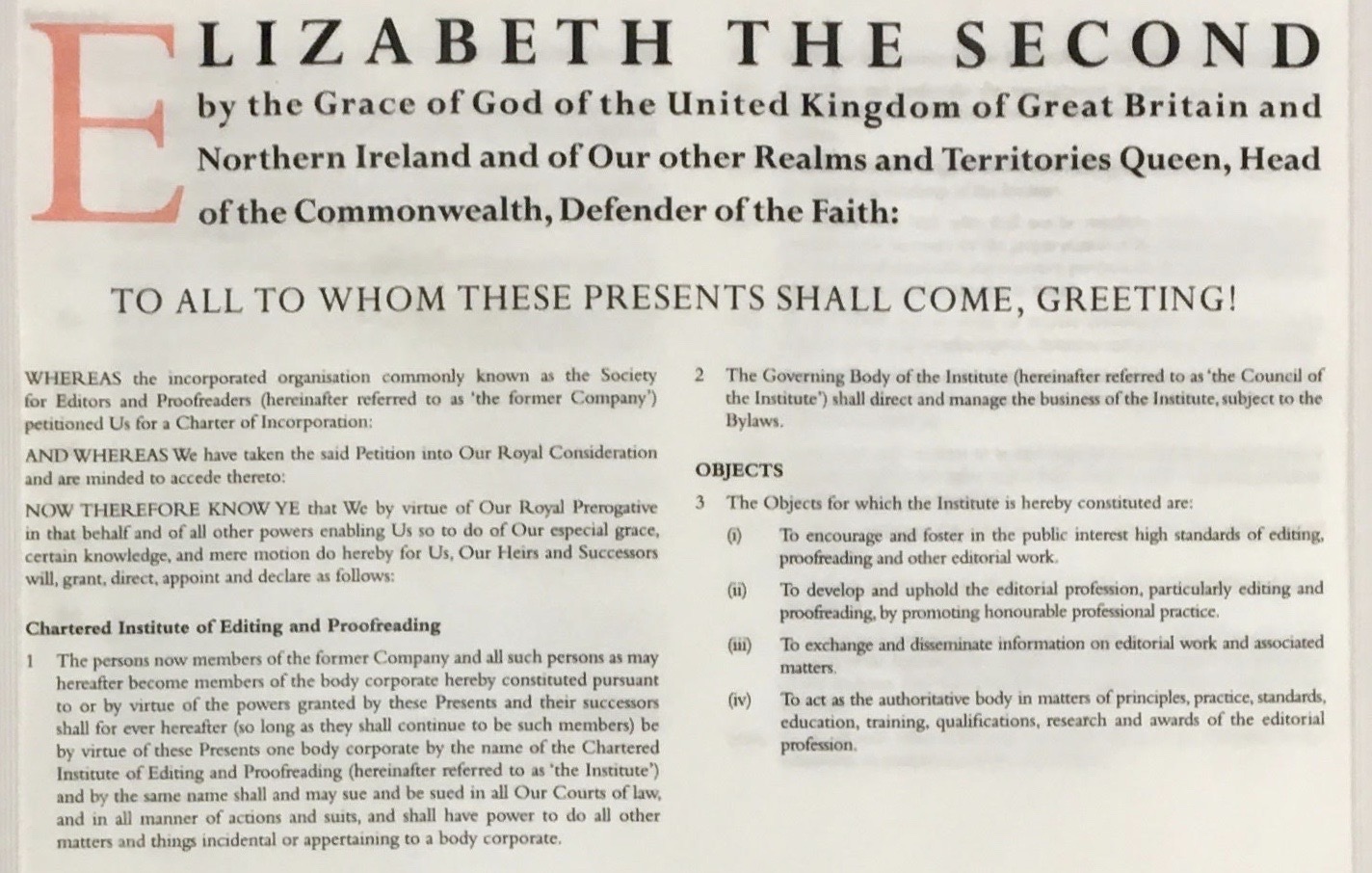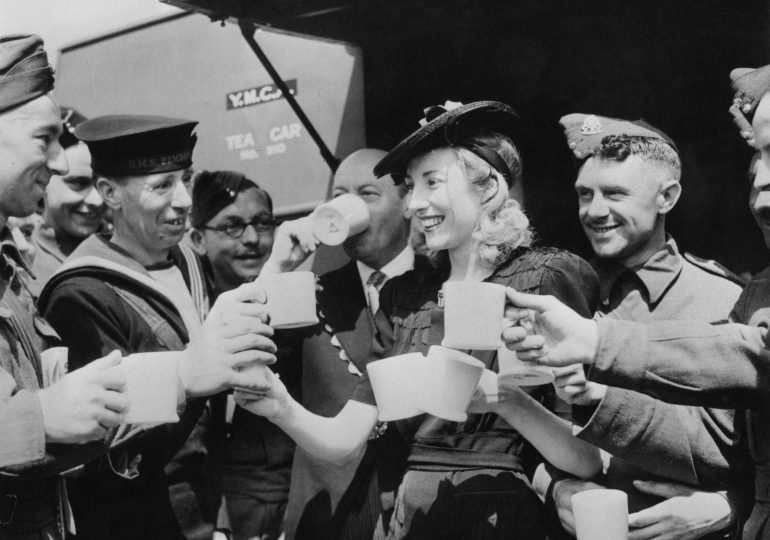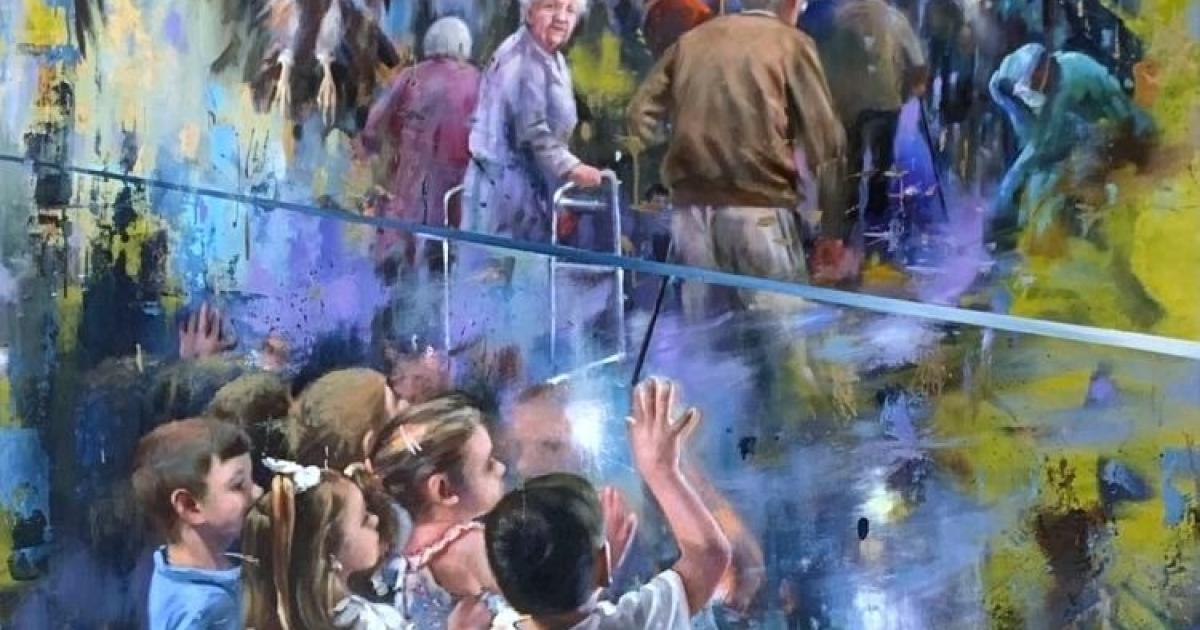Attention to Detail
The Queen’s English
The Society for Editors and Proofreaders (SfEP), established in 1988, was formally recognised by Her Majesty The Queen on 1 March when it was granted the status of chartership for its excellence in upholding standards in the English language. In its new guise it has become the Chartered Institute of Editing and Proofreading (CIEP).
As a membership body, the CIEP gives me a sense of belonging in what otherwise might just be deemed a world of pedants agonising over the placement of punctuation. Whilst this agonising might sometimes be true, the CIEP is more than just a group of people who gather to debate the pros and cons of the Oxford comma. In addition to our annual conference, where we get together to talk about the trade, we also explore throughout the year how the English language is applied in different scenarios and how its use changes over time.
The barbarians are coming!
You might ask why any of these things matter. Indeed, only last December the man responsible for leading the Apostrophe Protection Society made the news because even he felt it was finally time to give up fighting those who seemingly no longer cared about punctuation. Aged 96, John Richards had been campaigning for over twenty years but decided enough was enough. He blamed ‘barbarians’ and accused people of being ignorant and lazy ‘in these modern times’. Whether or not John had a point brings me on to the emergence and growth of ‘text speak’.
#TxtSpk
The highlight for me at last year’s conference was hearing Professor David Crystal speak. Professor Crystal is the CIEP’s honorary president and a world-renowned expert on linguistics. Author of over 100 books on the English language, he says more than 2,000 words have developed out of the digital age – such as ‘blog’, ‘tweet’ and even ‘Google’ – all of which have become established as both nouns and verbs. He believes teenagers read more than ever in this digital age and, even though they tend to shorten words when writing, they have a closer understanding of the way sounds are connected. He goes on to herald the use of hashtags as a useful means of managing, classifying and organising content in a searchable way. Professor Crystal actually suggests middle-aged people are the main culprits of using text speak in messages, as they shorten messages using contractions such as ‘gr8’ and ‘cu l8r’.

Kids and technology
Let me turn to my own daughter, who turned five early in the Covid-19 lockdown. I watched in amazement as she became increasingly tech savvy while undergoing home-schooling. Having never used a laptop before, she quickly learnt how to use the mouse to click, drag and drop while nimbly navigating her way around the keyboard. Like most kids, finding their way around their parents’ phones and tablets is no problem either.
I don’t mean to go off on a tangent here, but it’s important to dispel the myth that technology is dragging down literacy standards amongst our children. Of course, it’s not good practice to allow children to be glued to devices, and especially so at the dinner table, but what’s the difference between people reading the newspaper on their mobile phones or burying their heads in the broadsheets of yesteryear? Looking at the packed train in the picture below, I know which means of reading the ‘paper’ I would rather the person next to me were using.

Who cares about the Queen’s English anyway?
I would argue people of all ages do still care about punctuation. The Queen’s endorsement of the CIEP only serves to highlight the organisation’s beliefs, standards and work. Being granted chartership status was a huge turning point for the organisation. Supporting its PR and Marketing team, I helped the body to think about how it might want to be seen by prospective members and ways in which it could be portrayed more widely. Given the recent news about the dying use of the apostrophe, I asked myself: who cares about the Queen’s English anyway? The answer was right in front of me as I looked at an image of the parchment stamped with the Privy Seal. The answer was The Queen, of course!
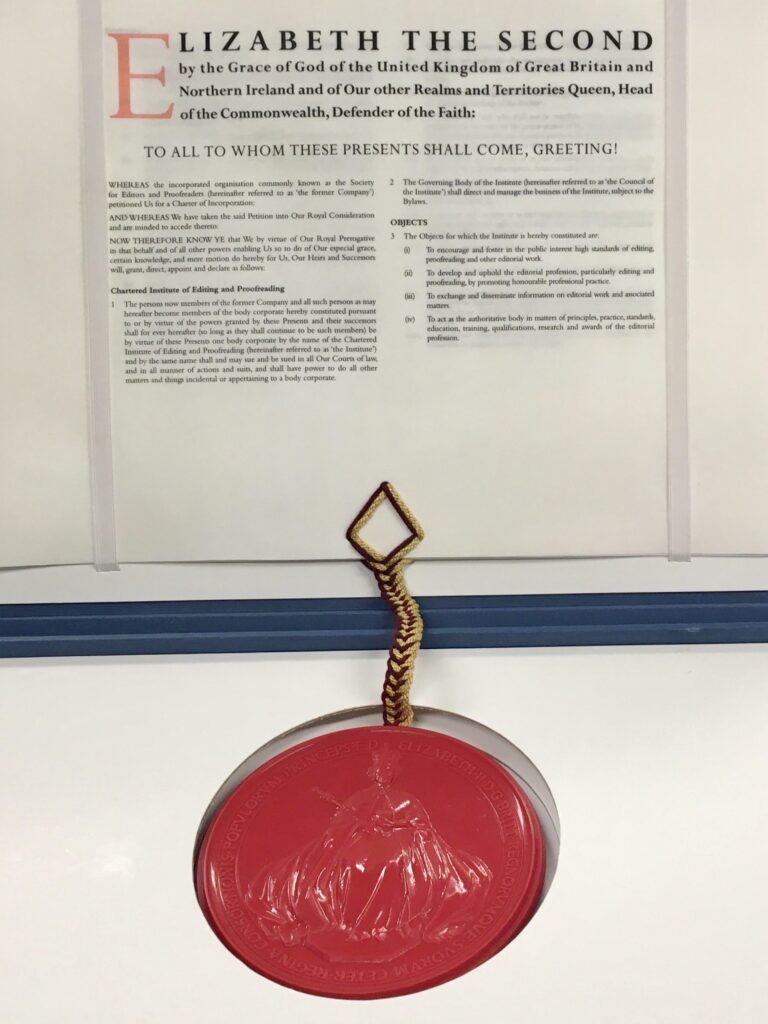
Language is constantly evolving
In response to John Richards, I would say the ignorance and laziness apparently present in modern times certainly have not won, but rather, as Professor Crystal puts it, language is constantly evolving. We don’t go around speaking like characters out of a Shakespearean play or from the Poldark series of novels. This is partly what makes linguistics so fascinating; as with everything else, it changes with events and evolves over time. I don’t think the terms ‘lockdown’, ‘social distancing’ and ‘new normal’ have ever been so prevalent in the English language. One might even be tempted to call these times ‘unprecedented’. Events play their part in language evolution.
As an editor and proofreader, my job is to listen to my clients, to establish their needs and to understand their audience. They might wish to strike an informal tone, using conversational text to make a website feel accessible and a business approachable. Or they might require copy to be edited in a highly professional style for an academic journal or medical publication. It is all about setting the right tone. I love the variety of my work. But, whatever the brief, attention to detail for me is of paramount importance.
About the author
Debbie is a member of the Chartered Institute of Editing and Proofreading (CIEP) and takes her professional development seriously. She is a sub-editor and proofreader for publishing company and client Dorson West through which she has worked on numerous titles including Hospital Times, Talent in Logistics, World Manufacturing Journal and Public Policy Projects. She has also provided copywriting services in the education sector. Prior to setting up her own company, Scott Communications, Debbie specialised in Defence advocacy, corporate affairs and political communications.
About the CIEP
The Chartered Institute of Editing and Proofreading (CIEP) is a non-profit body promoting excellence in English language editing. It sets and demonstrates editorial standards and offers a community, training hub and support network for editorial professionals – the people who work to make text accurate, clear and fit for purpose.
This blog post is also published at https://www.linkedin.com/pulse/attention-detail-debbie-scott/.
Scott Communications Salutes Our Forces
Last Thursday the sad news of Dame Vera Lynn’s passing made the headlines. Images of her entertaining the troops and generally boosting the nation’s morale during World War II prompted us to reminisce on how the country pulled together in true British fashion in those dark times. Only six weeks ago, when the UK was just getting used to lockdown and also celebrating the 75th anniversary of VE Day, Dame Vera spoke about the simple acts of bravery and sacrifice that still define our nation today.
Twice the Citizen
Indeed, just a few weeks before this the Government placed an additional 10,000 military personnel, including reservists, on a higher state of readiness to provide the COVID Support Force, the MOD’s contribution to the coronavirus response. Since then reservists have been mobilised to work alongside their regular counterparts to assist in the areas of health and science, as well as helping local authorities respond to the pandemic. Reservists from my former Royal Naval Reserve unit, HMS President in London, played their part in supporting communities in the capital and further afield. Some of their efforts can be read about here. These reservists truly embody Winston Churchill’s ‘Twice the Citizen’ epithet.
Armed Forces Week
It is very fitting in today’s difficult times that in the UK we are now celebrating Armed Forces Week to show our thanks to the entire Armed Forces community, including regular service personnel, reservists, veterans, cadets and their families. We thank them all for their extraordinary contribution to society.
This is the UK’s twelfth annual Armed Forces Week. Under normal circumstances a series of events would now be taking place to showcase the best our Armed Forces have to offer, culminating in Armed Forces Day itself on Saturday 27 June. But, unlike in previous years, Armed Forces Week is being held virtually with celebrations taking place online and at a distance. Yet the importance of these events is in no way diminished, and our gratitude to our serving personnel is as deep as ever. This is especially the case as we pay special thanks to the first batch of reservists who demobilised only last week following their work in the COVID Support Force.
The Armed Forces Covenant
As a former naval reservist myself for twelve years, and as the wife of a serving reservist, I certainly don’t take our Armed Forces for granted. Last year Scott Communications, the PR and digital transformation company my husband and I founded in 2018, marked Armed Forces Week by signing the Armed Forces Covenant. I was proud to sign the Covenant, with my husband alongside me in his naval uniform, at an event hosted by the Federation of Small Businesses (FSB). Tom Tugendhat, our local MP for Tonbridge and Malling, and himself a former Army Reserve officer, spoke at the event about his military experience serving in Iraq and Afghanistan. He was followed by X-Forces CEO Ren Kapur who described the support available to veterans and reservists starting their own businesses.
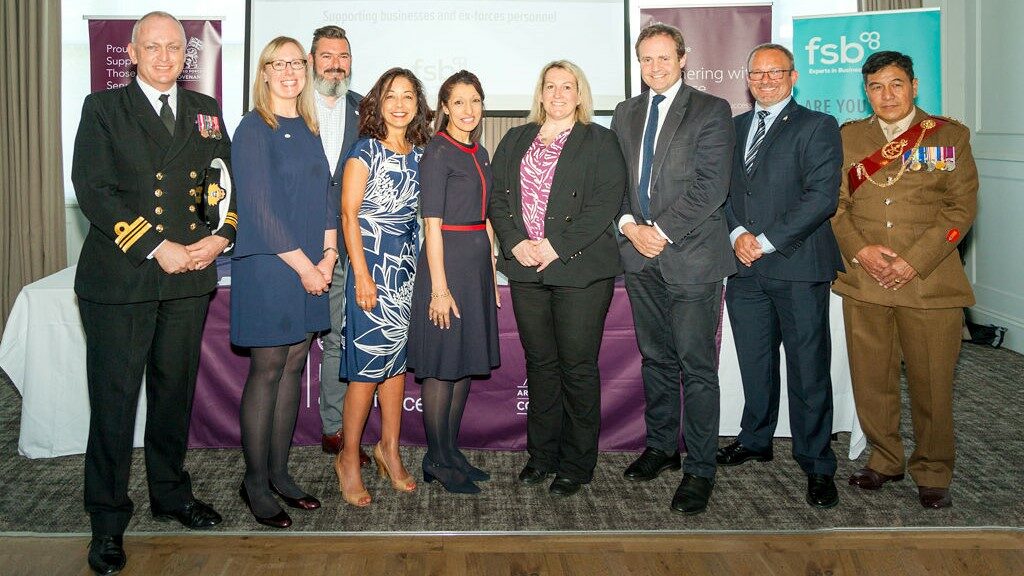
Reservists in the Workplace
The Covenant signing event informed local businesses about steps they might take to support the Armed Forces community. One year on, Scott Communications is seeking to extend its support to the military community by joining other employers in the Defence Employer Recognition Scheme. This will enable us as company directors to share best practice and ideas with other employers and our clients on how to make the most of the skills and experience reservists and veterans have to offer in the workplace, while also advocating support to Defence and the Armed Forces community in general.
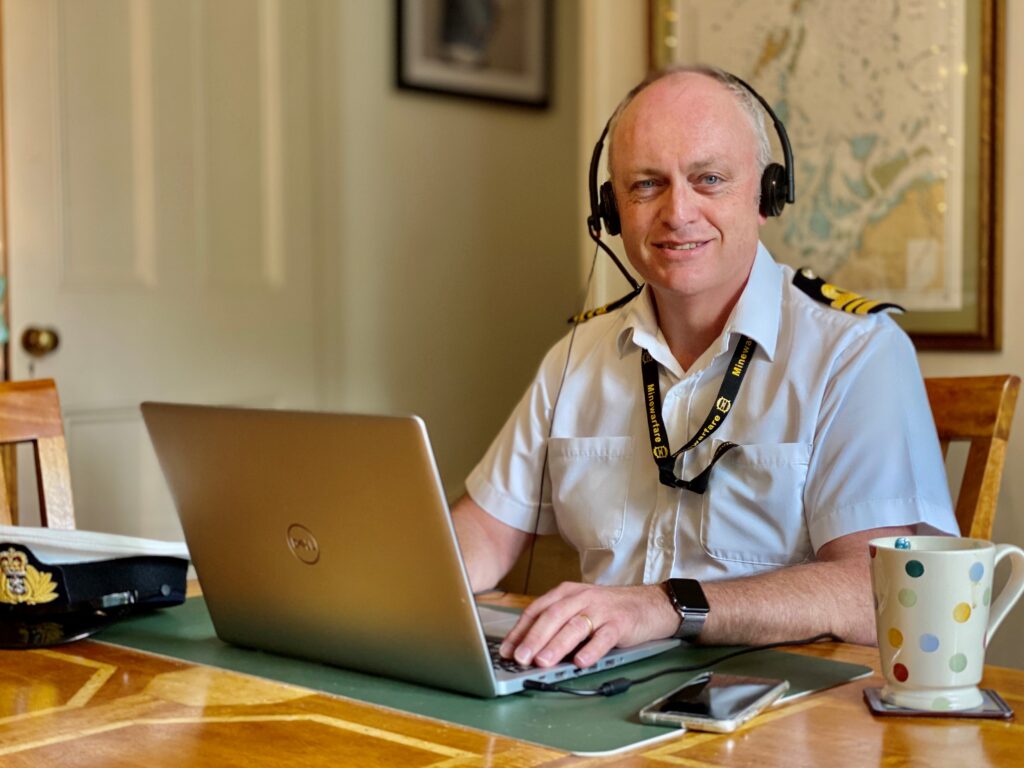
What You Can Do to Show Your Support
Armed Forces Week is an opportunity for the whole nation to celebrate the military community and to recognise the work it does to protect the country and its interests at home and overseas. In the absence of the national Armed Forces Day event that was scheduled to take place in Scarborough on Saturday, you can join Scott Communications in supporting the Armed Forces online. This includes following activities on Facebook and Twitter. You can also show how important our Armed Forces are to you by using the hashtag #SaluteOurForces in your social media posts. This is a simple way for anyone to pay tribute to the British Armed Forces community for its hard work, dedication and efforts to keep us safe in the UK and across the globe.
It is with special thanks this year that we acknowledge not only those who fought to protect our country in the past but also those who have been working to keep us safe during today’s troubled times. To show your thanks, simply post a photo or video of yourself or your friends and colleagues saluting. You can submit your images here.
This post is also published at https://www.linkedin.com/pulse/scott-communications-salutes-our-forces-debbie-scott.
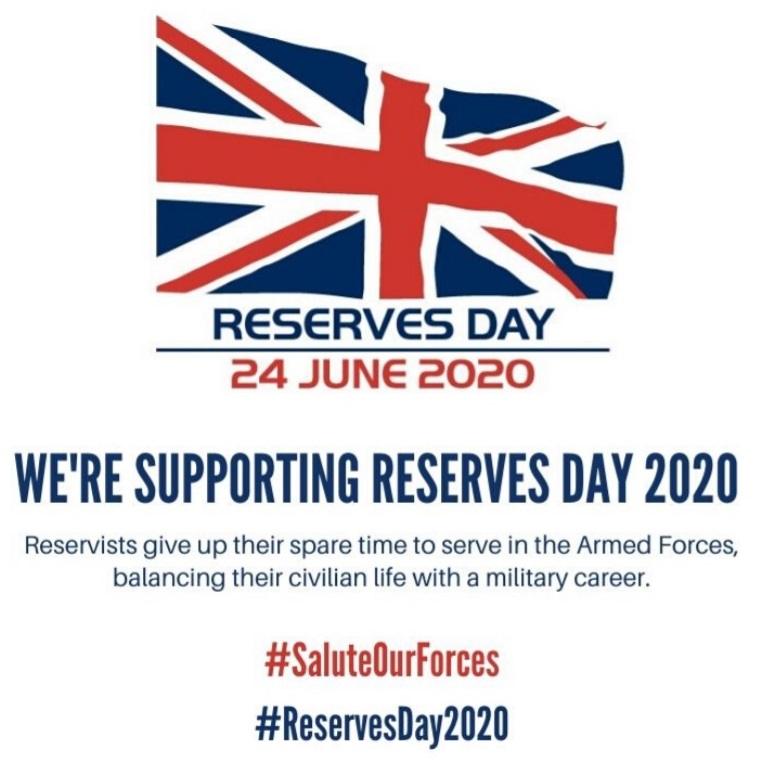
Banner image: On 4th June 1942 forces Sweetheart Vera Lynn, acting on behalf of the Variety Artistes Ladies’ Guild, presented a mobile canteen to the mayor of Westminster who accepted it on behalf of the YMCA. Here she serves the first cups of tea to servicemen from the canteen, which is stationed in Trafalgar Square. (Photo by Keystone/Getty Images)
Reflections at the End of the Covid-19 Lockdown
In the Prime Minister’s statement on coronavirus on Wednesday 18 March, he confirmed that total UK Covid-related deaths had risen to 104 and declared the closure of schools from the end of that week ‘until further notice’. Albeit drastic, the decision wasn’t unexpected. Coronavirus cases were rising and the country was nowhere near the peak of this dreadful disease. We had all seen footage from other European countries that were ahead of the UK in relation to their position on ‘the curve’ and we didn’t want to end up like Spain or Italy. (Look how that ended up.) Parents UK-wide would now somehow have to juggle both working and teaching full-time.
To return to school or not?
Well, after ten weeks of home-schooling, my five-year-old daughter went back to school last Monday. My husband and I were apprehensive in sending her back, especially with UK Covid-related deaths approaching the 40,000 mark. But, so far, so good, for us at least. The school is very organised, parents are abiding by the strict new rules and even the Reception class have had it sufficiently drummed into them not to let anyone step into their ‘bubble’. Don’t get me wrong, home-schooling wasn’t without its challenges, but my husband and I felt more than a little pang of sorrow as she skipped out of school on her first day back and told us she hadn’t missed being taught by ‘Mrs Mummy’ and ‘Mr Daddy’.
So, just as we had got used to the ‘new norm’ under lockdown, so we must get used to the next phase brought about by the easing of the restrictions.
The benefits of lockdown
As a family, we have actually enjoyed some aspects of lockdown. Yes, it’s been strange. The Government essentially took away the nation’s freedom, but very few people resisted because the severity of the problem was alarmingly clear and we knew it was for our own good.
The experience of lockdown in the Scott household revolved around starting each day by working out with Joe Wicks on YouTube, then joining my daughter’s Reception class registration by Zoom, followed by a full-on timetable of virtual lessons using Microsoft Teams. We looked forward to our daily exercise but also went on longer walks at weekends, discovering new woodland paths and places of local natural beauty we hadn’t known about previously. In the process we got fit and appreciated each other’s company without the normal pressure and stresses of everyday routine, work and commuting. Life slowed down and fortunately the spring weather in south east England was glorious.
Technology and missing loved ones
The distance between my wider family and me has been particularly poignant as my brother sadly died on 2 March. At the time coronavirus was still just something we read about in newspapers and which seemed predominantly to be affecting people stuck on cruise ships in the Pacific. My brother Stephen never knew the extent to which coronavirus later rampaged across the UK. How the world changed so quickly after his death. His funeral was affected by it, but thankfully it took place just days before more stringent rules prevented funerals taking place at all in some cases. We had a small number of close family present, and it was live streamed to over two hundred of his wider friends and family.
I hasten to add that work has been pretty busy during this period. My husband and I both run our own businesses and it’s been no mean feat trying to home school a five-year-old in addition to juggling client deadlines and, dare I say it, trying to grow our businesses too.
Thank goodness then for modern technology. Not only has it enabled the smooth continuation of business and the establishment of a decent enough home-schooling routine, it has also allowed families and friends everywhere to stay connected. For every so-called benefit lockdown has brought with regards to quality of life, I think it’s fair to say many people have missed, and continue to miss, being with loved ones in person. I, for one, have felt the separation from my wider family, including my parents, sister and my sister’s family. Technology has offered us the wonderful opportunity of connecting living room to living room to take part in fun family quizzes and, for that, I really am grateful.
The ultimate sacrifice
What really brought home the severity and sombreness of Covid-19 for me, though, was working on the latest issue of leading health publication Hospital Times, and in particular this issue’s list of frontline health workers who had made the ultimate sacrifice in the war on this dreadful disease. As its sub-editor and proofreader, I checked and re-checked the photos, names, professions and other details of all those health and care workers who had fallen victim to Covid-19. The list seemed endless, and what made me feel so incredibly sad was how I couldn’t help but feel their deaths might have been prevented if only they had been provided with the correct personal protective equipment to do their jobs. These people are our heroes and should be honoured and remembered always. I’m sure many of us will still feel the urge to clap every Thursday at 8pm and at least will do so silently to ourselves as we remember those who gave their lives to protect and help others in the battle against Covid-19.
For now, we will continue to take baby steps as lockdown eases and pray the R-rate doesn’t rise again as life tentatively gets back to normal. We must remember that even while the death rate is falling nationally, every one of those deaths represents a family member who is dear to many people. I came across the painting above by Spanish artist Juan Lucena on social media last week. Its messaging around grandparents who didn’t get to say goodbye to their grandchildren really struck a chord with me. My heart goes out to those people with elderly relatives in care homes.
These times have been strange indeed and life might never be quite the same again as we all adapt to new working practices and social distancing measures. But life goes on for all those left behind by loved ones and for all of us lucky enough not to have been immediately impacted by Covid-19. Yet the disease has touched every one of us in one way or another and I don’t think any of us will forget the sacrifices our keyworkers have made to keep the wheels of our society turning. For that I thank them all.
You can read the latest issue of Hospital Times here.
This post is also published at https://www.linkedin.com/pulse/reflections-end-covid-19-lockdown-debbie-scott/.
